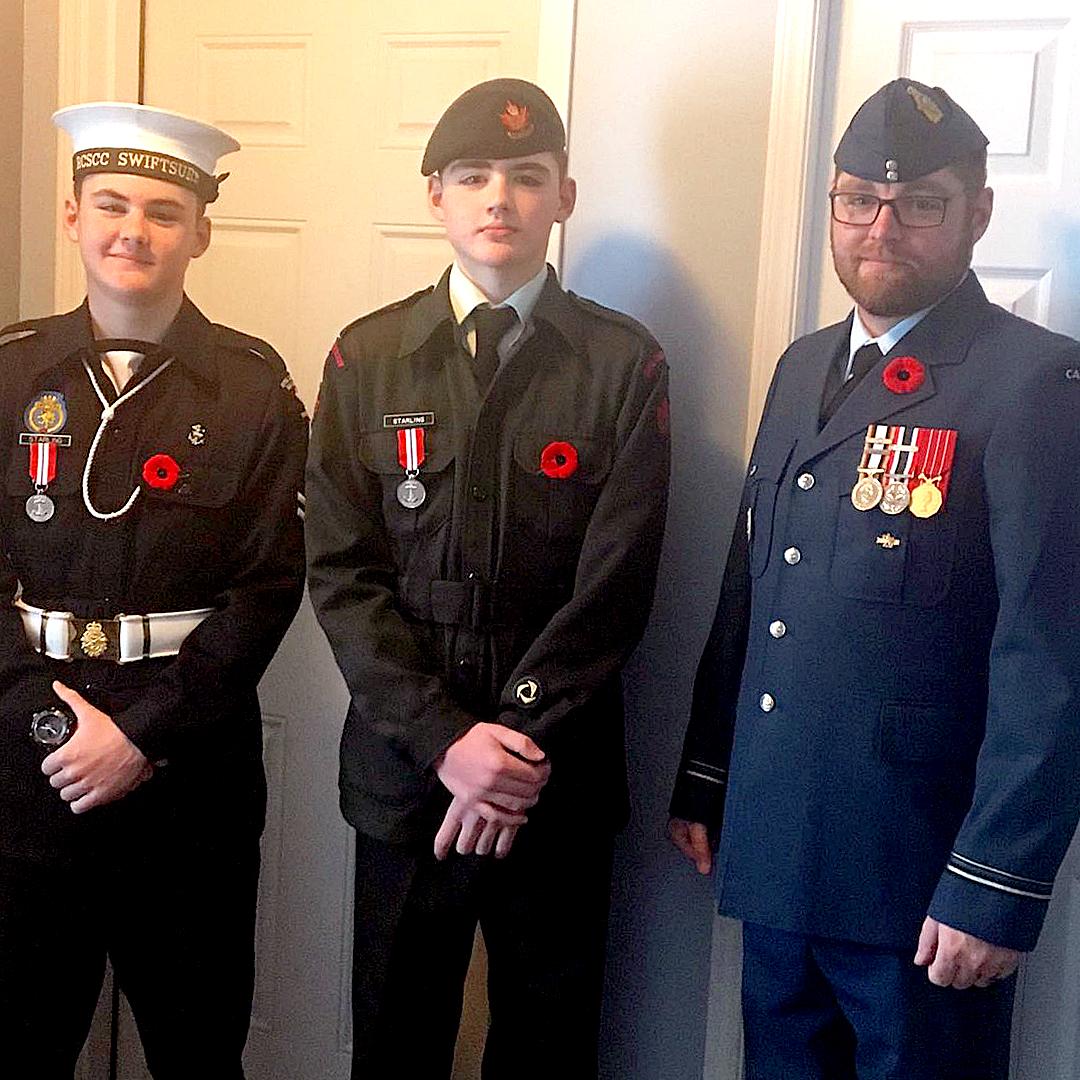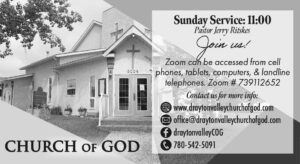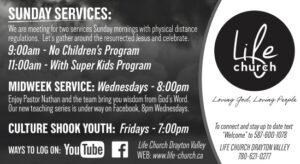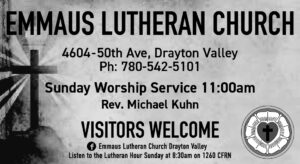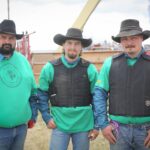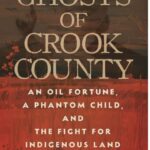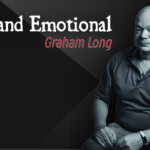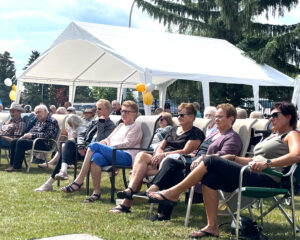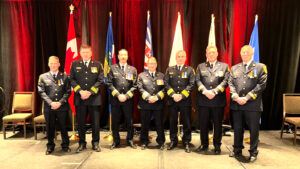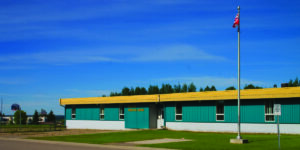As we reflect on the importance of Remembrance Day and the role the Canadian military has played in conflicts past and present the Free Press reached out Drayton Valley’s Lane Starling on for his thoughts on his life as an active member of Canada’s Armed Forces.
Fredrickson: How long have you served with the Canadian Military?
Starling: I joined the Military in 2003. I was 17 years old and still in high school. I Joined the Reserves (Part time) as a Field Artilleryman with 20 Field Regiment in Edmonton. I found out later, after he passed, that it was the same Regiment my grandfather Chester Vig served in during the Second World War.
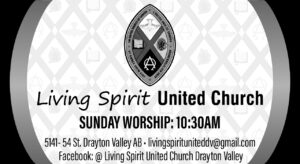
Living Spirit United Church
Everyone welcome. Sunday Worship, 10:30 We are residents of Drayton Valley, members and adherents of
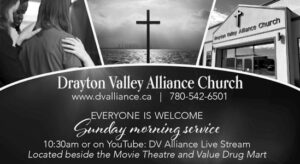
Drayton Valley Alliance Church
Join us Sunday Mornings 10:30 am Everyone Welcome! Phone: 780-542-6501 Email: office@dvalliance.ca Mailing address: Box

Breton Dental Clinic
Share on facebook Facebook Share on email Email Share on linkedin LinkedIn Share on whatsapp
Dr. Chris Birchall Dentistry
Dr. Birchall Dentistry in Drayton Valley, Alberta. A dentist in Drayton Valley, Alberta.
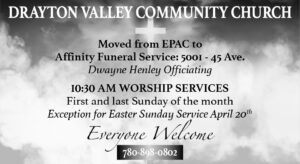
Drayton Valley Community Church
DV Community Church. Located at Affinity Funeral Services, officiated by Dwayne Henley.
Fredrickson: What tours have you done?
Starling: In 2006 I fought in Afghanistan on a 155mm Howitzer crew. It was a “busy” 6 month tour. I took part in dismounted patrols through the mountains looking for Taliban, was once ambushed outside Khandahar City, and fought at the First Battle of Panjwai. There was a second local Drayton Valley resident, a good friend of mine, Keith Alexandrovitch who was with the infantry there at the same time.
Then in 2017 I was in Latvia as part of the NATO Enhanced Forward Presence contingent. I was a Joint Terminal Attack Controller that time. Which is a fancy way of saying that I specialized in calling in airstrikes. That was a much calmer tour and it was great to see and work in that area of the world with all the different countries coming together to form one fighting unit.
Recently I made the switch from the Army over to the Air Force and became an officer. Now I work for NORAD (North American Aerospace Defense) at 22 Wing in North Bay, Ontario. Here I am an Air Battle Manager. Basically I’m Air Traffic Control for military operations. We “manage” air battles (dog fights), air-to-air refueling and conduct 9/11 type intercepts of suspicious and hijacked aircraft. We also track Santa.
Fredrickson: Why did you join the military?
Starling: As to why I joined? I can’t really say. It was more of a calling than anything else. From as early as I can remember I never really had a question as to doing something else. I’ve had other jobs, worked at the sawmill, and in the oilfield for a time however nothing really stuck. It wasn’t until I came back from Afghanistan that it solidified for me. I realized it was just what I was meant to do. In 2007 I went over to the Regular Force. Been here ever since.
Fredrickson: What does Remembrance Day mean to you?
Starling: When I was younger, Remembrance day wasn’t really a big deal. It wasn’t, truly. It seemed to me to be a faceless war, where someone would call off a list of names that I had absolutely no connection with. Coming from a small town in rural Alberta, I think we could count on one hand the number of living Vets we had in the community. My Grandfather never talked about the war, at least certainly not with me and I never knew any of the other vets. Everyone else would try to explain why it was important; however it all seemed very hollow and disconnected, far away and impersonal. Obviously that has changed. For me now Remembrance Day is very much a personal thing. For me it’s not about the wars and conflicts we have fought in, it’s about the people that I’ve met and have known along the way and their stories they have shared. The first house my wife and I purchased was from a Korean War vet, our neighbor served in Cyprus and Bosnia. I spent a month in South Korea with several Commonwealth War Vets and walked their old battlefield. Obviously my own stories and people I knew from the Afghan war have an impact, but most importantly it made everything relatable. All the stories, the history. For all the reasons people told me that Remembrance Day was important I now understood. Unfortunately I’m not sure that’s a meaning I can impart on anyone else. For me it was a very personal journey to get to my meaning of Remembrance Day. But if anyone ever wants to have a coffee and hear a story next time they see me around town, don’t hesitate to stop and ask me.
An all Canadian team that included a local resident was able to win the rodeo for the first time in the history of the World Famous Miles City Bucking Horse Cowboy Mardi Gras.
Wilfred Titanich was one of a team of three that attended the three-day event in Miles City, Montana from May 15-18. Titanich along with two brothers, Cory and Cody Loken, were the first all Canadian team to win at Bucking Horse since the first Miles City Bucking Horse Sale started in 1951.
Each member of the team came home with around $7,500 US, says Titanich.
“We got Championship Buckles and we got Championship Holders, too,” he says.
The team participated in the Wild Horse Racing event, which involves at least three people and an untouched horse. The horse starts out in the bucking chute and two members of the team follow the horse out, holding onto a long lead. One person is the mugger, and their job is to control the horse’s head by covering its eyes with his arm, which calms it and prevents it from rearing and hurting someone. The shanker holds onto the rope so it doesn’t run away. The rider saddles it, mounts, and holds on tight as they race to the finish line on a wild horse.
“Wild Horse Racing is one of the oldest events in rodeo,” says Titanich.
Though the event is called Wild Horse Racing, the horses used in the event are owned, but untouched.
Throughout the year, Titanich works the Canadian Wild Horse Racing Association Circuit, spending most of his time in Alberta, but also attending some events in B.C. and Saskatchewan, where he competes in both amateur and pro rodeos.
“Honestly, it’s really addicting,” says Titanich. “It looks really crazy, and it is pretty wild, but it’s super addicting. It’s an adrenaline rush in sport.”
He says he would encourage people who like competitive events to try Wild Horse Racing.
The Loken brothers have both been in the sport for about 15 years, says Titanich. Both of them were about 14-years-old when they first started out. Titanich has been in the sport for three or four years.
Normally, the Lokens race with their dad, Jason, and Titanich has his own team. But the three of them thought it would be fun to head down to Miles City for some fun.
The Bucking Horse Sale was a stand-alone event, says Titanich. His team is getting ready for the circuit this summer.
“We can rodeo every weekend from now to the end of October,” he says.
Anyone looking for information about which wild horse racing rodeos are coming up can visit www.wildhorseracing.ca. Titanich says he will be in Brooks at the Lea Park Rodeo this weekend and in Killam for the Killam Rodeo that will be held outdoors in Sedgewick this year.
Fredrickson: What challenges/opportunities have you faced during your career?
Starling: A lot of the challenges and the opportunities in my career were the same events. But not solely for me, and not the reasons you might think. My military career isn’t mine alone, it includes my family the entire time. Obviously Afghanistan was a challenge for me but it also left my wife alone as a single parent while I was gone. Our second son was born while I was in Panjwai and when I came home my oldest son (not yet two at the time) took a while to even remember who I was. One of the biggest challenges was the biggest opportunity. Moving away for the first time. It was hard. The Starling family is pretty rooted in Drayton Valley. It’s all my wife and I have ever known, and so to pack up and move to New Brunswick was a big challenge. Since then we have lived in four different provinces and each time my wife has had to restart her career or find a new job. My kids adjust to another new school and new friends. I’ve been gone a lot with work. In the last year, I’ve been gone nine months. My family has more or less become accustomed to me entering and exiting the family routine and picking up as we go. But on the same token, we have a really close knit family because of all that. When we move to someplace new, the first people we know are each other. My kids have lived on the east and west sides of Canada and everywhere in-between. They have seen and appreciated Canadian culture across the whole country. They have been introduced to different ideas and views that are important to different people across the country. We have lived in bilingual communities and my kids can now speak French because of it. Everyone has learned how to meet new people and friends. Whenever we have to move now, we see it as an opportunity instead of a challenge.
The funniest thing is though, no matter where we live in the country, whenever I hit the Thorsby bend on the way back to Drayton to visit, I get the weirdest nostalgic feeling of “I’m home.”

